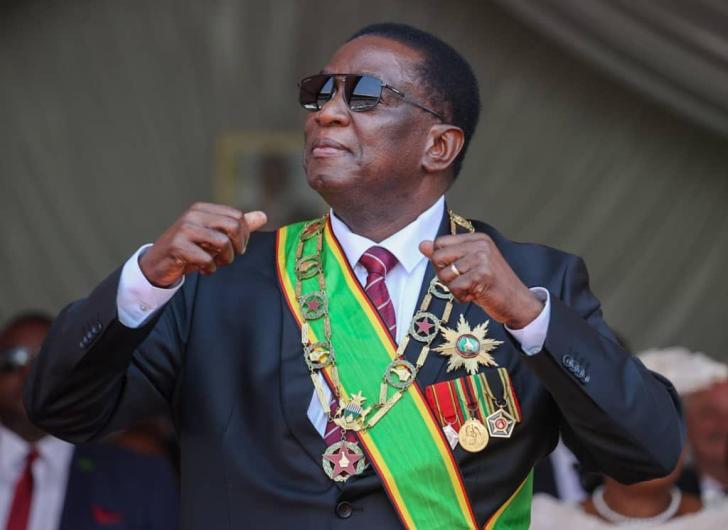News / National
Zanu-PF rolls out ED2030 campaign drive
25 Nov 2024 at 19:38hrs |
0 Views

The ruling Zanu-PF party has initiated a series of inter-district meetings nationwide to rally support for extending President Emmerson Mnangagwa's tenure in office until 2030, despite his current term ending in 2028.
The campaign, spearheaded by prominent Mnangagwa allies such as Midlands Provincial Affairs Minister Owen Ncube and Local Government Minister Daniel Garwe, seeks to consolidate party support while identifying internal dissenters opposed to the move.
Divisions Emerge Within the Party
The push for Mnangagwa's extended rule has deepened rifts within Zanu-PF, particularly between factions aligned to Mnangagwa and Vice-President Constantino Chiwenga, who is reportedly positioning himself as Mnangagwa's successor.
While Mnangagwa has publicly insisted he will step down at the end of his term in 2028, party insiders allege that he is privately backing the campaign. Speaking at recent meetings, provincial chairpersons urged members to dismiss speculation that Mnangagwa had rejected the proposal for term extension, highlighting the coordinated nature of the campaign.
Provincial Support Amid Legal Concerns
Mashonaland East chairperson Daniel Garwe downplayed the constitutional hurdles highlighted by Zanu-PF's secretary for legal affairs, Patrick Chinamasa, who had noted the requirement for a referendum to amend term limits.
"Vision is from God that [Mnangagwa] should continue in office to build the country," Garwe stated, emphasizing that legal compliance was a procedural task, while the party's vision required Mnangagwa's continued leadership.
In Masvingo, provincial chairperson Robson Mavhenyengwa acknowledged internal divisions but urged members to support the resolution for Mnangagwa's extended leadership.
"No one disputed the resolution that the President should remain in office," Mavhenyengwa said, adding that legal advice from Chinamasa was not a rejection of the agenda but a clarification of the procedural requirements.
Low Attendance and Strategic Challenges
Despite the coordinated messaging, meetings in Harare and Mashonaland East saw low turnout, signaling possible resistance or apathy within the party's structures. Similar gatherings in Chitungwiza and Bikita were planned to rally further support.
However, some party insiders revealed discussions during the Harare Provincial Coordinating Committee (PCC) meeting regarding potential constitutional amendments to remove or modify presidential term limits, paving the way for Mnangagwa to remain in power indefinitely.
Official Responses
Zanu-PF spokesperson Christopher Mutsvangwa downplayed the controversy, describing the meetings as routine party activities.
"Zanu-PF usually holds these meetings to strengthen our party. We discuss issues affecting our people, and the current PCC meetings were no exception," Mutsvangwa said.
Minister Garwe also dismissed claims that the meetings focused on the 2030 agenda, stating that their main purpose was to promote agricultural programmes such as-PFumvudza/Intwasa.
Implications for the Party and Nation
The campaign has raised concerns about deepening factionalism within Zanu-PF, with analysts warning that the push for Mnangagwa's term extension could lead to intensified power struggles. As the debate unfolds, the party faces the challenge of balancing constitutional compliance with its internal political agenda.
The campaign, spearheaded by prominent Mnangagwa allies such as Midlands Provincial Affairs Minister Owen Ncube and Local Government Minister Daniel Garwe, seeks to consolidate party support while identifying internal dissenters opposed to the move.
Divisions Emerge Within the Party
The push for Mnangagwa's extended rule has deepened rifts within Zanu-PF, particularly between factions aligned to Mnangagwa and Vice-President Constantino Chiwenga, who is reportedly positioning himself as Mnangagwa's successor.
While Mnangagwa has publicly insisted he will step down at the end of his term in 2028, party insiders allege that he is privately backing the campaign. Speaking at recent meetings, provincial chairpersons urged members to dismiss speculation that Mnangagwa had rejected the proposal for term extension, highlighting the coordinated nature of the campaign.
Provincial Support Amid Legal Concerns
Mashonaland East chairperson Daniel Garwe downplayed the constitutional hurdles highlighted by Zanu-PF's secretary for legal affairs, Patrick Chinamasa, who had noted the requirement for a referendum to amend term limits.
"Vision is from God that [Mnangagwa] should continue in office to build the country," Garwe stated, emphasizing that legal compliance was a procedural task, while the party's vision required Mnangagwa's continued leadership.
In Masvingo, provincial chairperson Robson Mavhenyengwa acknowledged internal divisions but urged members to support the resolution for Mnangagwa's extended leadership.
"No one disputed the resolution that the President should remain in office," Mavhenyengwa said, adding that legal advice from Chinamasa was not a rejection of the agenda but a clarification of the procedural requirements.
Low Attendance and Strategic Challenges
Despite the coordinated messaging, meetings in Harare and Mashonaland East saw low turnout, signaling possible resistance or apathy within the party's structures. Similar gatherings in Chitungwiza and Bikita were planned to rally further support.
However, some party insiders revealed discussions during the Harare Provincial Coordinating Committee (PCC) meeting regarding potential constitutional amendments to remove or modify presidential term limits, paving the way for Mnangagwa to remain in power indefinitely.
Official Responses
Zanu-PF spokesperson Christopher Mutsvangwa downplayed the controversy, describing the meetings as routine party activities.
"Zanu-PF usually holds these meetings to strengthen our party. We discuss issues affecting our people, and the current PCC meetings were no exception," Mutsvangwa said.
Minister Garwe also dismissed claims that the meetings focused on the 2030 agenda, stating that their main purpose was to promote agricultural programmes such as-PFumvudza/Intwasa.
Implications for the Party and Nation
The campaign has raised concerns about deepening factionalism within Zanu-PF, with analysts warning that the push for Mnangagwa's term extension could lead to intensified power struggles. As the debate unfolds, the party faces the challenge of balancing constitutional compliance with its internal political agenda.
Source - newsday
Join the discussion
Loading comments…


































